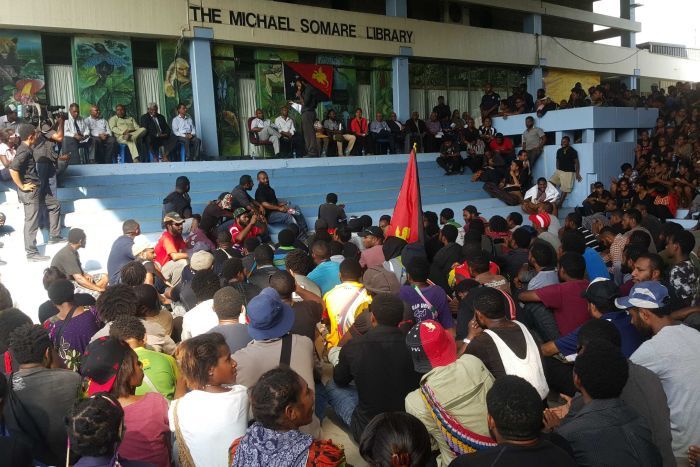PNG university students protest against government interference in ongoing corruption cases
Updated
Concerned community groups say rising tensions over a disputed arrest warrant for Papua New Guinea's Prime Minister have led the country to a new constitutional crisis.
Key points:
- Spokesperson says legal interference from senior officials is damaging trust in institutions
- NGOs and observer groups form a Community Coalition Against Corruption
- The students have been warned the protest could be shut down if moved off campus
This week, students at the country's largest university boycotted classes and held the first major protests against the ongoing legal battle that has prevented anti-corruption officers from interviewing Prime Minister Peter O'Neill.
The protests came as PNG's Supreme Court involved itself in the dispute and confronted the country's police commissioner over his closure of the country's last remaining anti-corruption body, the National Fraud and Anti-Corruption directorate.
Non-government organisations and observer groups have formed a Community Coalition Against Corruption.
Lawrence Stephens, the group's spokesman from Transparency International, said conflict between PNG's constitutional office-holders was bad for stability and governance.
"We've termed it a constitutional crisis and it's something that Papua New Guinea has had before," he said.
"It's brought on by people trying to do things with constitutional powers which need to be considered carefully by the courts and it appears to be an assault on democracy, an assault on the constitution."
 Photo:
The students been warned the protest may be shut down if it is taken off campus. (ABC: Eric Tlozek)
Photo:
The students been warned the protest may be shut down if it is taken off campus. (ABC: Eric Tlozek)
Mr Stephens said the delays, complications and manoeuvring by senior officials in response to the anti-corruption probe was damaging Papua New Guineans' trust in institutions.
"If we do not [protest], nobody will ... the students have this power to do it and we will do it.
Student leader Samuel Apa
"The country is losing sight of what good governance is," he said.
Student leaders at the University of Papua New Guinea and Lae's University of Technology have called for the Prime Minister to step aside and allow anti-corruption police to interview him.
The protest is the first that police have not shut down due to it being on university grounds, but the students been warned against taking it off campus.
One of the student leaders, Samuel Apa, said the students were sacrificing their own education, because other groups in society had been stopped from expressing their anger about the current conflict.
"If we do not do it, nobody will do it and others outside us will not do it," he said.
"The students, we have this power, this time, to do it and we will do it."
Various court cases involving the Prime Minister and senior ministers remain before the courts.
But Mr O'Neill's legal team have lost an attempt to set aside an unsuccessful appeal and interim orders preventing anti-corruption officers from arresting the Prime Minister and Finance Minister James Marape.
The Supreme Court refused leave for lawyers to make a slip rule application, meaning there are now fewer restrictions on anti-corruption police investigating and charging Mr O'Neill.
More stories:
- Police Commissioner reopens anti-corruption unit
- Court tells Police Commissioner to reopen anti-corruption unit
- PM urged to rein in top cop as corruption saga engulfs country
- Police at war over anti-corruption arrests
- Attorney-General arrested by anti-corruption police
- Police charge Supreme Court judge with corruption
- Papua New Guinea PM loses bid to prevent anti-corruption investigation
Topics: corruption, activism-and-lobbying, law-crime-and-justice, youth, papua-new-guinea, pacific
First posted









